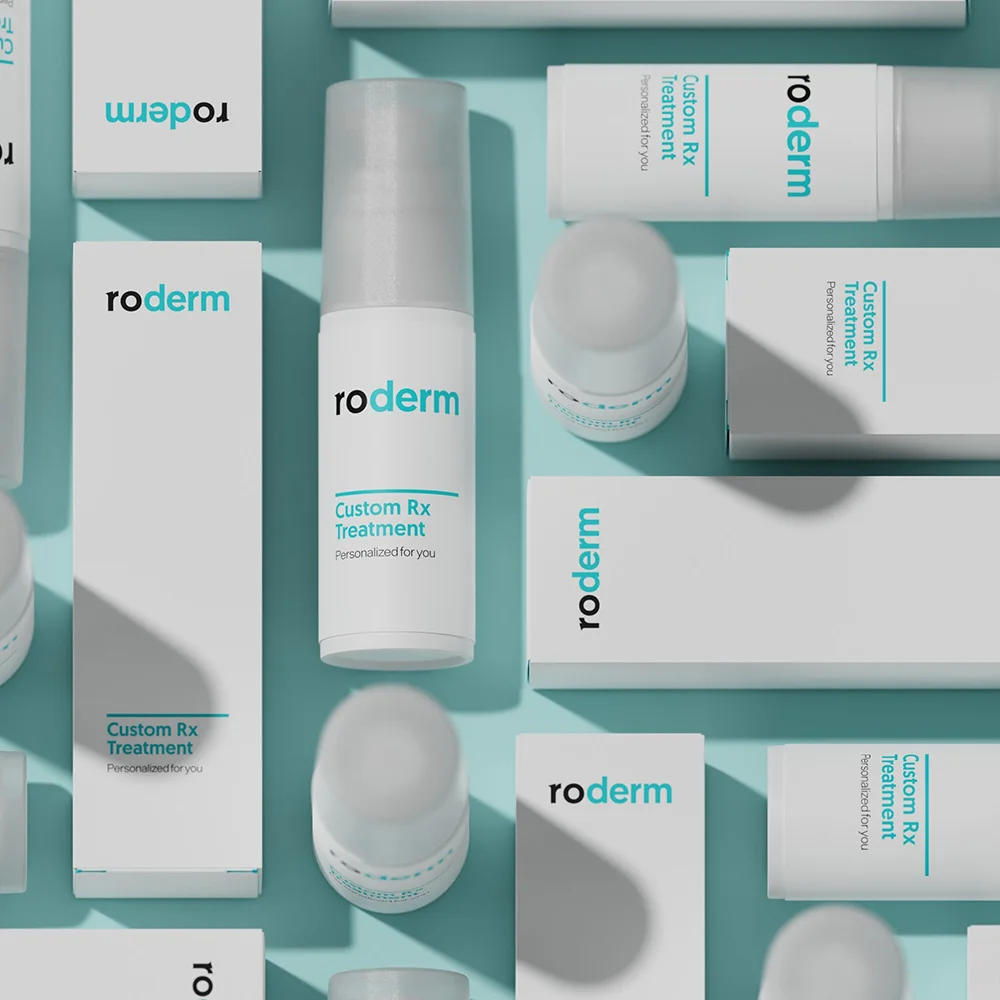Here's what we'll cover
Here's what we'll cover
While we often associate acne with adolescence, puberty, and hormones, it is a skin condition that can follow men into adulthood (Collier, 2008).
Fortunately, there are treatments available that are successful at clearing up the skin and minimizing the appearance of those pesky pimples and blackheads.
Read on to learn more about the best acne treatments for men.
What is acne?
Acne is the result of sebum (your body’s natural oil) and dead skin cells clogging the hair follicles (pores), causing inflammation and skin breakouts anywhere on the body, but often on the face, neck, back, and chest. Acne can present itself in a number of ways. It might show up as (AAD-a, n.d.):
Blackheads and whiteheads: clogged pores caused by a buildup of excess oil and dead skin cells
Zits (pimples): inflamed pores
Cysts and Nodules: pus-filled pimples causing tenderness and pain due to inflammation
Adult acne in men is commonly triggered by fluctuations in the hormone testosterone, which activates oil glands causing blocked pores and acne breakouts (Makrantonaki, 2011).
The best acne treatments for men
The good news is that acne can be treated with over-the-counter (OTC) and prescription medication and the right skincare routine. Since everyone experiences acne differently, there are various treatment options depending on skin type and severity of symptoms.
A licensed dermatologist can suggest the best acne treatment for your skin type, typically consisting of one or more of the following acne products.
Benzoyl peroxide
Benzoyl peroxide is a common acne-fighting ingredient found in over-the-counter facial cleansers. It is a popular antiseptic that kills bacteria and reduces inflammation while eliminating whiteheads, blackheads, and pimples (Del Rosso, 2008).
You’ll need to keep using it consistently, and it may take a couple of weeks before you see improvement. Sometimes it is combined with other topical or oral treatments. Side effects include skin irritation, staining or bleaching of fabric, and allergic reactions (Zaenglein, 2016).
Salicylic acid
Facial cleansers containing salicylic acid are frequently used to clear up milder forms of acne. Salicylic acid is a hydroxy acid (more on those below) that acts as an exfoliating agent, effectively breaking down oil and dead skin cells that clog the pores (Woodruff, 2013).
Many OTC face wash products contain salicylic acid. They can be used a couple of times a day, but you may want to start slowly and build up how often you use them.
Other hydroxy acids
Hydroxy acids, including alpha-hydroxy acids (AHAs) and beta-hydroxy acids (BHAs), are agents that eliminate the top layer of dead skin cells and stimulate new skin cell growth (Moghimipour, 2012). Hydroxy acids are found in many OTC facial washes, toners, creams, and acne spot treatments. They can be found on the ingredient label as:
Glycolic acid (AHA)
Lactic acid (AHA)
Salicylic acid (BHA)
Niacinamide
Niacinamide is a form of vitamin B3, and it may come with anti-inflammatory properties that improve skin function, prevent infection, and promote skin hydration. While its primary function is to reduce the signs of aging, it is also found to reduce acne symptoms (Walocko, 2017).
Niacinamide is found in many acne skin care products containing benzoyl peroxide. Topical niacinamide’s most common side effects are itchiness, redness, mild burning, and irritation (Rolfe, 2014).
Topical retinoids
Retinoids are acne medications that stem from vitamin A and are commonly used to treat acne symptoms, including whiteheads, blackheads, and pimples. They are also effective in reducing the signs of aging and hyperpigmentation.
Common retinoids include:
Tretinoin: The most common retinoid, tretinoin works by unclogging pores and stimulating new skin cell growth.
Retinol: A mild retinoid used to reduce signs of aging, it is most effective at treating acne when combined with other ingredients.
Adapalene: This retinoid is available OTC in low concentrations and often has milder side effects.
While tretinoin is found in prescription acne products, retinol and adapalene are found in many OTC facial products used to treat oily skin and mild acne.
Topical and oral antibiotics
When over-the-counter acne skincare products don’t effectively treat acne, a dermatologist often prescribes topical or oral antibiotics to treat severe acne symptoms.
Clindamycin is a popular prescription topical antibiotic that kills bacteria and minimizes inflammation and swelling. It is often prescribed with acne products containing benzoyl peroxide and topical retinoids (Zaenglin, 2016).
Oral antibiotics are used to systemically treat severe acne and work by killing the bacteria in clogged pores reducing inflammation and the appearance of pimples and cystic acne.
Common oral antibiotics used to treat acne in men include (Zaenglin, 2016):
Tetracycline
Doxycycline
Azithromycin
Isotretinoin
Isotretinoin is a potent oral retinoid used to treat the most severe cystic and nodule-producing acne that hasn’t responded well to other types of treatment.
Men using isotretinoin are monitored by a dermatologist because it can cause several side effects, including (AAD-b, n.d.; Pile, 2021):
Chapped or dry lips (cheilitis)
Dry and itchy skin
Dry eyes
Thinning hair
Trouble seeing at night
Muscle or joint pain
Stomach issues
Skincare tips for men
Having a consistent skincare routine is essential for combating acne and keeping your skin clear and healthy.
A few tips for preventing breakouts if you have acne-prone skin include (AAD-c, n.d.):
Wash your face twice and day and after sweating.
Use alcohol-free products that are gentle on your skin.
Use your fingertips to apply a cleanser instead of a washcloth or sponge.
Avoid touching your face.
Wear sunscreen every day and avoid tanning beds.
Apply an oil-free, non-comedogenic moisturizer to hydrate your skin.
Acne scar treatments
Acne scars happen because of the tissue-destroying inflammation that accompanies a bad breakout. Acne scars can also be a common source of embarrassment, low self-esteem, and depression.
Thankfully, various treatment options are available to minimize the appearance of acne scars, allowing you to achieve clear skin and boost self-confidence (Gozali, 2015).
Acne scar treatment options include (Gozali, 2015):
Chemical peels to remove the topmost layers of your skin to improve the look or feel of your skin
Dermabrasion to mechanically remove damaged skin and help smooth out scars by essentially sanding down the skin
Laser treatments to create controlled injury so that the skin heals the damaged area
Skin needling to create micro punctures in the skin
Punch excision, which is an incision-based surgery for deep scars that uses skin grafts to repair scar tissue
The bottom line on men’s acne treatments
Adult acne is common in men. Although it can affect self-confidence, acne is a highly treatable skin condition with several different acne products for every skin type, including over-the-counter and prescription medications.
For mild acne, establishing a consistent skincare routine using OTC facial washes containing benzoyl peroxide and hydroxy acid can help clear up and prevent acne symptoms. If you have severe acne that does not respond to OTC products, seeking the help of a healthcare provider to prescribe topical and oral antibiotics or possibly an isotretinoin regimen can put you on the path to clearer skin.
DISCLAIMER
If you have any medical questions or concerns, please talk to your healthcare provider. The articles on Health Guide are underpinned by peer-reviewed research and information drawn from medical societies and governmental agencies. However, they are not a substitute for professional medical advice, diagnosis, or treatment.
American Academy of Dermatology Association (AAD-a). (n.d.). Acne: signs and symptoms. Retrieved June 16, 2022 from https://www.aad.org/public/diseases/acne/really-acne/symptoms
American Academy of Dermatology Association (AAD-b). (n.d.). Isotretinoin: the truth about side effects . Retrieved June 16, 2022 from https://www.aad.org/public/diseases/acne/derm-treat/isotretinoin/side-effects
American Academy of Dermatology Association (AAD-c). (n.d.). Acne: tips for managing. Retrieved June 16, 2022 from https://www.aad.org/public/diseases/acne/skin-care/tips
Collier, C. N., Harper, J. C., Cantrell, W. C., et al. (2008). The prevalence of acne in adults 20 years and older. Journal of the American Academy of Dermatology, 58 (1), 56-59. doi:10.1016/j.jaad.2007.06.045. Retrieved from https://www.sciencedirect.com/science/article/abs/pii/S019096220701081X
Del Rosso, J. (2008). What is the Role of Benzoyl Peroxide Cleansers in Acne Management? The Journal of Clinical and Aesthetic Dermatology, 1 (4), 48-51. Retrieved from https://www.ncbi.nlm.nih.gov/pmc/articles/PMC3016935/#:~:text=Benzoyl%20peroxide%
Gozali, M. V. & Zhou, B. (2015). Effective Treatments of Atrophic Acne Scars. The Journal of Clinical and Aesthetic Dermatology, 8 (5), 33-40. Retrieved from https://www.ncbi.nlm.nih.gov/pmc/articles/PMC4445894/
Makrantonaki, E., Ganceviciene, R., & Zouboulis, C. (2011). An update on the role of the sebaceous gland in the pathogenesis of acne. Dermato-Endocrinology, 3 (1), 41-49. doi:10.4161/derm.3.1.13900. Retrieved from https://www.tandfonline.com/doi/full/10.4161/derm.3.1.13900
Moghimipour, E. (2012). Hydroxy Acids, the Most Widely Used Anti-aging Agents. Jundishapur Journal of Natural Pharmaceutical Products, 7 (1), 9-10. Retrieved from https://www.ncbi.nlm.nih.gov/pmc/articles/PMC3941867/
Pile, H. D. & Sadiq, N. M. (2021). Isotretinoin. StatPearls . Retrieved on June 8, 2022 from https://www.ncbi.nlm.nih.gov/books/NBK525949/
Rolfe, H. M. (2014). A review of nicotinamide: treatment of skin diseases and potential side effects. Journal of Cosmetic Dermatology, 13 (4), 324-328. doi:10.1111/jocd.12119. Retrieved from https://pubmed.ncbi.nlm.nih.gov/25399625/
Walocko, F. M., Eber, A. E., Keri, J. E., et al. (2017). The role of nicotinamide in acne treatment. Dermatologic Therapy, 30 (5). doi:10.1111/dth.12481. Retrieved from https://pubmed.ncbi.nlm.nih.gov/28220628/
Woodruff, J. (2013). A double-blind, placebo-controlled evaluation of a 2% salicylic acid cleanser for improvement of acne vulgaris. Journal of the American Academy of Dermatology , 68 (4), AB12. doi:10.1016/j.jaad.2012.12.052. Retrieved from https://www.jaad.org/article/S0190-9622(12)01331-X/fulltext#relatedArticles
Zaenglein, A. L., Pathy, A. L., Schlosser, B. J., et al. (2016). Guidelines of care for the management of acne vulgaris. Journal of the American Academy of Dermatology, 74 (5), 945–973. doi:10.1016/j.jaad.2015.12.037. Retrieved from https://pubmed.ncbi.nlm.nih.gov/26897386/










